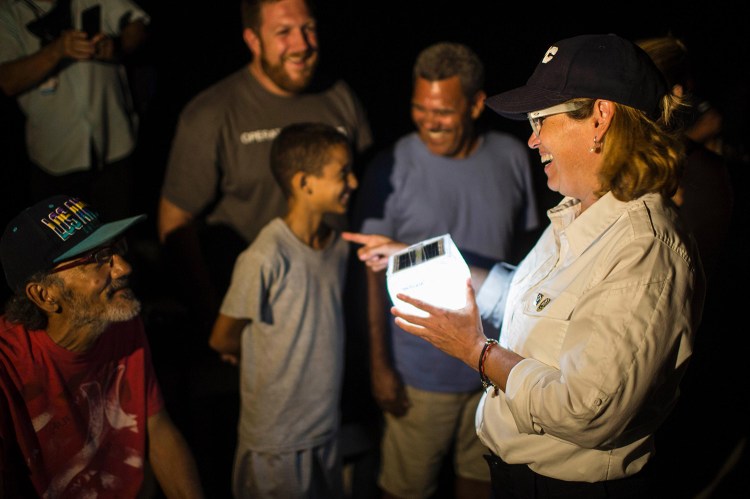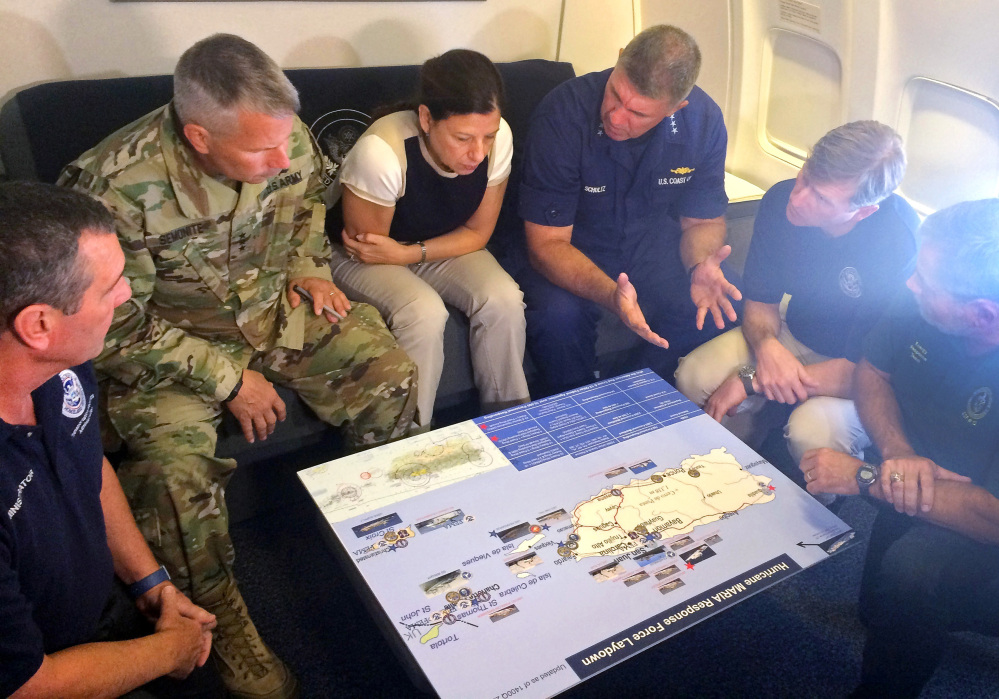SAN JUAN, Puerto Rico — The gulf between what Trump administration officials in Washington are saying about hurricane recovery efforts and what people in Puerto Rico are seeing on the ground came into sharp view Friday, as the mayor of the territory’s capital city made an exasperated plea for help that seemed to capture the collective despair of the island’s residents.
The administration has continued to defend its handling of the disaster, which has swelled into a humanitarian crisis amid widespread shortages of water and electricity, while local officials and residents alike have continued to plead for basic necessities.
Carmen Yulín Cruz, the mayor of San Juan, gave voice to this tension on Friday when she criticized acting Homeland Security Secretary Elaine Duke’s assertion that the federal response is “a good-news story in terms of our ability to reach people” and the relatively low death toll. In televised interviews, she said the situation on the island is anything but good news, with people scraping for food, and for their lives.
Cruz delivered what she described as a “mayday” call to Washington in a news conference Friday, decrying federal and local government logistical failures in delivering basic goods to communities across Puerto Rico. She said the federal response has “collapsed,” emotionally describing how provincial mayors have tried unsuccessfully to retrieve critical goods from the government command center in San Juan.
“People are dying in this country,” Cruz said. “I am begging, begging anyone that can hear us, to save us from dying. If anybody out there is listening to us, we are dying and you are killing us with the inefficiency and the bureaucracy.”
Millions across Puerto Rico – a U.S. territory that is home to more than 3 million American citizens – have struggled since Hurricane Maria tore across the island on Sept. 20, leaving them without access to electricity, drinking water, food and medical supplies. Hospitals have lost power, leading to concerns of a public-health emergency.
The U.S. government’s initial response has come under increasing scrutiny, with critics comparing it to the poor federal reaction to Hurricane Katrina in 2005 and contrasting it unfavorably with the effort shown after two recent hurricanes battered Texas and Florida. The Trump administration has bristled at the criticism. Tom Bossert, the White House homeland security adviser, said Friday: “I don’t accept that we’re doing anything short of everything we can do.”
Duke traveled to Puerto Rico on Friday and spoke briefly about her previous comments, saying she was proud of the work federal officials and first responders are doing.
“Clearly, the situation here in Puerto Rico, after the devastating hurricane, is not satisfactory, but together we are getting there and the progress to date is very, very strong,” she said at a news briefing. “The president and I will not be fully satisfied, however, until every Puerto Rican is back home, the power is back on, clean water is freely available, schools and hospitals are freely open and the Puerto Rican economy is working.”
At least 16 people have died in Puerto Rico, officials say, and the toll is expected to climb as the recovery continues. President Trump told reporters Friday before leaving the White House to spend the weekend at his golf club in New Jersey that “we’ve made tremendous strides” responding in Puerto Rico, and he pointed to the death toll during his comments.
“The loss of life – it’s always tragic – but it’s been incredible the results that we’ve had with respect to loss of life,” Trump said. “People can’t believe how successful that has been relatively speaking.”
Trump has underscored the challenges involved in the recovery, highlighting praise he has received from local officials and disparaging the news media for its coverage. He has also referenced conditions that existed in Puerto Rico before the storm and mentioned the expected cost of the rebuilding effort.
“Ultimately the government of Puerto Rico will have to work with us to determine how this massive rebuilding effort . . . will be funded and organized, and what we will do with the tremendous amount of existing debt already on the island,” Trump said during a speech Friday.
Trump repeatedly asserted that his administration was facing unprecedented challenges in responding to a storm “of historic and catastrophic severity” and described Puerto Rico as “an island surrounded by water – big water, ocean water.”
His remarks about Puerto Rico stand in stark contrast to the way he responded to hurricanes Harvey and Irma in Texas and Florida.
“He refers to them as if they’re some foreign entity or alien culture,” said Robert Dallek, a presidential historian.
Melissa Mark-Viverito (D), speaker of the New York City Council and a native of Puerto Rico, said Trump was treating Puerto Ricans as “second-class citizens.” She visited the island earlier this week; her mother still lives there.
“There is a double standard of how Puerto Ricans are being treated,” she said on MSNBC after Trump tweeted a message discussing the potential recovery cost.
Puerto Rico Gov. Ricardo Rosselló, who introduced Duke at the briefing Friday, again praised her and the Trump administration’s efforts. While the Trump administration has in recent days ramped up its efforts, rushing military hardware and other assets to Puerto Rico as it became apparent the initial response was inadequate, Rosselló acknowledged Friday there is still more to be done.
“The response still is not where it needs to be, certainly it’s not,” Rosselló told MSNBC on Friday morning. He added: “We do need more help.”
Army Lt. Gen. Jeff Buchanan told reporters Friday that there are not yet enough people and assets in place to help Puerto Rico recover.
“No, it’s not enough, and that’s why we are bringing a lot more,” the three-star general said of the resources brought to Puerto Rico thus far. “It makes sense, but it’s part of the natural flow of things.”
FEMA Region 2 director John Rabin said in an interview that during the first few days after the storm, his agency was focused on saving lives by opening roads and ports to move supplies to the needy.
Rabin said FEMA had backloaded ships and planes of cargo ready to deliver goods days earlier and had food, generators and water in place. But they had to move resources to clear badly damaged ports, radar navigation systems and clear debris from roads before any of those supplies reached Puerto Rico.
Hector Pesquera, the commissioner of public safety and security, said law enforcement’s efforts were focused on escorting fuel shipments and providing security at supermarkets planning to reopen, he said. Pesquera said he was not concerned about looting because he thinks residents are keeping it from happening.
Cruz, the San Juan mayor, had worried about looting, but she said in an interview Thursday that the curfew imposed by the governor seemed to be working, adding that crime was not her major concern in the aftermath of the storm.
Still, she worried that if the government doesn’t help supply more food and water to communities in need, “people will become desperate.”
“When people become desperate in life-or-death situations, they may be prone to do something they wouldn’t normally do,” she said while walking through the streets of La Perla, a neighborhood in Old San Juan.
From a historic city wall in Old San Juan, wooden signs bearing pleas could be seen from a basketball court below: “SOS, we need water, canopies, food. La Perla.”
At dusk on Thursday evening, Jaeliz Perez, 10, played basketball with her cousin, Luis Perez, in the neighborhood, while a nearby group of volunteers cleaned up trees and other debris with construction vehicles.
Jaeliz and her cousin headed home as the sun began to set, needing to get back before curfew and before darkness covered the neighborhood.
“My grandpa wouldn’t like it” if she stayed out any later, she said. “It can be dangerous.”
They went home and joined their extended family sitting on the front porch in the darkness, chatting together by the light of one cellphone flashlight. The inside of their home was entirely dark, and the view from their back balcony showed a hillside that was pitch black.
“Look, the only thing giving us light is the moon,” said Eva Elias, Jaeliz’s grandmother.
Other than water, fuel remains perhaps the most valuable commodity on the island. Daniel Delgado, a longtime resident of Santurce, a San Juan neighborhood, spent four hours in a line to get one 20-pound propane tank so he could cook dinner for his family. He doesn’t agree with anyone who chooses to steal, but he sees the logic behind it.
“There’s no help for the poor people, here in San Juan or out in the country,” he said. “If there were help, if someone brought water and fuel, then there wouldn’t be any crime at all. What would you do if you couldn’t work and had no food and your child looks up at you in the evening and said ‘Papi, I’m so hungry.'”
Copy the Story LinkSend questions/comments to the editors.




Success. Please wait for the page to reload. If the page does not reload within 5 seconds, please refresh the page.
Enter your email and password to access comments.
Hi, to comment on stories you must . This profile is in addition to your subscription and website login.
Already have a commenting profile? .
Invalid username/password.
Please check your email to confirm and complete your registration.
Only subscribers are eligible to post comments. Please subscribe or login first for digital access. Here’s why.
Use the form below to reset your password. When you've submitted your account email, we will send an email with a reset code.